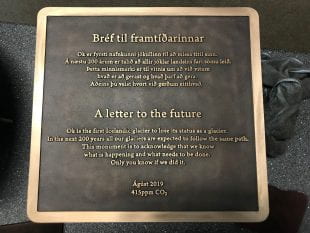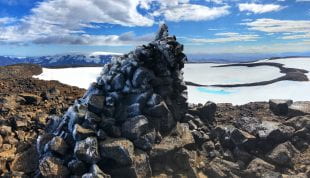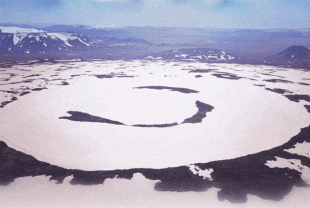Rice University
Office of Public Affairs / News & Media Relations
Editor’s note: Icelandic Prime Minister Katrín Jakobsdóttir, Icelandic Minister for the Environment and Natural Resources Guðmundur Ingi Guðbrandsson and former president of Ireland and United Nations High Commissioner for Human Rights Mary Robinson will attend the event.
MEDIA ADVISORY
Amy McCaig
713-348-6777
amym@rice.edu
Memorial honoring lost glacier to be installed in Iceland Aug. 18
Media invited to attend ceremony for country’s first major glacier lost to climate change
HOUSTON – (Aug. 13, 2019) – Following the hottest month in recorded human history, the first Icelandic glacier to fall victim to climate change will be remembered with a memorial to be unveiled Aug. 18 — the first of its kind in the world, installed at the very place where the glacier Okjökull, known as “Ok,” stood.
Icelandic Prime Minister Katrín Jakobsdóttir, Minister for the Environment and Natural Resources Guðmundur Ingi Guðbrandsson and Mary Robinson, former Irish president and United Nations High Commissioner for Human Rights, along with researchers from Rice University in Houston, author Andri Snær Magnason (who wrote the words for the memorial plaque) and geologist Oddur Sigurðsson, will offer remarks at the memorial service to be held at 2 p.m. on Ok mountain in Borgarfjörður. The trek to the site and installation of the memorial is being called the “Un-glacier Tour.”
The event will mark Sigurðsson’s first visit to the site since he determined in 2014 that Okjökull (“Ok glacier” in Icelandic) no longer met the criteria to be classified as a glacier.

The memorial for the former glacier Okjökull. Words by Andri Snær Magnason. Photo by Grétar Thorvaldsson/Málmsteypan Hella.
“This will be the first time since it was declared ‘dead’ that Ok glacier will be evaluated by a glaciologist to see if any glacial remnant ice remains,” said Cymene Howe, an associate professor of anthropology at Rice and the principal investigator for the project “Melt: The Social Life of Ice at the Top of the World,” which examines the cultural impacts of climate change.
Howe and Dominic Boyer, a professor of anthropology at Rice, produced the 2018 documentary “Not Ok” about the lost glacier. The film, narrated by former Reykjavík Mayor Jón Gnarr, shares the story of Ok and serves as a cautionary tale about the potential fate of other glaciers. According to Howe and Boyer, Iceland loses approximately 11 billion tons of ice per year, and scientists fear all of the island country’s 400-plus glaciers will be gone by 2200.
“On Aug. 18 we will install the first memorial to a glacier lost to climate change anywhere in the world,” Howe said. “Memorials everywhere stand for either human accomplishments like the deeds of historic figures, or the losses and deaths we recognize as important. By memorializing a fallen glacier, we want to emphasize what is being lost — or dying — the world over, and also draw attention to the fact that this is something that humans have “accomplished,” although it is not something we should be proud of.”
“Climate change is first and foremost a social problem — one with physical manifestations,” Boyer said. “The challenges we face now — including ones that are melting the glaciers — are that global civilization and its infrastructures of economy, transportation and information are based fundamentally on fossil fuel use.”
Boyer said an obsession with expansion and growth is the core problem that has to be addressed.
“What we really need now is more than just post-oil energy,” he said. “What we learned from our previous research project on wind power in Mexico is that it is possible to implement renewable energy projects with very colonial and extractivist values. We need a civilization oriented instead by cultural values of humility and sustainability.”
Howe and Boyer hope the monument will raise awareness about the decline of Iceland’s glaciers and the impact of climate change, issues they frequently discuss on their Cultures of Energy podcast.
“The conversation about climate change can be very abstract, with many devastating statistics and sophisticated scientific models that may feel incomprehensible,” Howe said. “Perhaps a monument to a lost glacier is a better way to fully grasp what we now face. As cultural anthropologists, we understand the power of symbols and ceremony to provoke feelings, even for something as far away as a glacier that is now only ‘dead ice.'”
Members of the media are invited to participate in the hike and ride a bus to and from the event. The bus will depart Reykjavík at 9 a.m. Aug. 18 and return in the evening. Howe and Boyer will be available for interviews leading up to the ceremony, as well as in-person interviews in Reykjavík on Aug. 17 and at the ceremony site in Borgarfjörður on Aug. 18.
Media interested in attending the event and/or interviewing Howe or Boyer may contact Amy McCaig, senior media relations specialist at Rice, at 713-348-6777 or amym@rice.edu. Media can also RSVP for the tour online at https://www.notokmovie.com/.
-30-
This news release can be found online at http://news.rice.edu/.
Follow Rice News and Media Relations via Twitter @RiceUNews.
Related materials:
Glacier photos: https://news2.rice.edu/files/2019/08/Ok2.jpeg
https://news2.rice.edu/files/2019/08/Ok1.jpeg
Photo credit: Ragnar Antoniussen
Memorial photo: https://news2.rice.edu/files/2019/08/IMG_1842-3-e1565021361669.jpg
Photo credit: Grétar Thorvaldsson/Málmsteypan Hella
Cymene Howe bio: https://anthropology.rice.edu/cymene-howe
Dominic Boyer bio: https://anthropology.rice.edu/dominic-boyer
Rice Department of Anthropology: https://anthropology.rice.edu/
Located on a 300-acre forested campus in Houston, Rice University is consistently ranked among the nation’s top 20 universities by U.S. News & World Report. Rice has highly respected schools of Architecture, Business, Continuing Studies, Engineering, Humanities, Music, Natural Sciences and Social Sciences and is home to the Baker Institute for Public Policy. With 3,962 undergraduates and 3,027 graduate students, Rice’s undergraduate student-to-faculty ratio is just under 6-to-1. Its residential college system builds close-knit communities and lifelong friendships, just one reason why Rice is ranked No. 1 for lots of race/class interaction and No. 2 for quality of life by the Princeton Review. Rice is also rated as a best value among private universities by Kiplinger’s Personal Finance.
If you do not wish to receive news releases from Rice University, reply to this email and write “unsubscribe” in the subject line. Office of News and Media Relations – MS 300, Rice University, 6100 Main St., Hou




